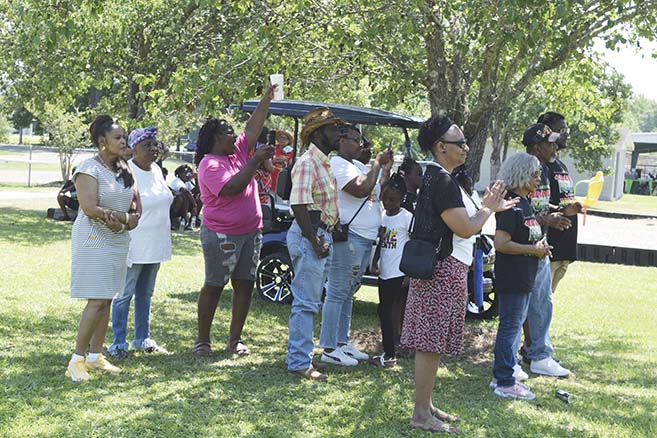
By DON FLETCHER
News Staff Writer
A small crowd of Atmore’s black population braved the pre-summer heat last Saturday (June 15) to mark the official date on which slavery ended in the United States.
“We may not be large in number, but we are here,” said Sandra Gray, who moderated the program and organized the parade that preceded it.
Juneteenth, now a federal holiday, is considered the “longest-running African American holiday” and has been called “America’s second Independence Day.” It is generally observed on the third Saturday in June.
On June 19, 1865, the provisions of the Emancipation Proclamation — which only freed slaves in the former Confederate states — were enforced in Texas, the last state to adhere to the presidential decree.
According to the National Museum of African American history, Major General Gordon Granger and about 2,000 U.S. soldiers went to Galveston Bay and announced that the 250,000 people of color who lived in Texas were thereby free by presidential decree.
Although June 19 is considered the date of the final emancipation, history tells us that other states held out until the 13th Amendment to the U.S. Constitution was ratified on December 6, 1865.
Juneteenth became a federal holiday in 2021, when Pres. Joe Biden signed the Juneteenth National Independence Day Act into law. Before that, blacks in most U.S. states recognized or observed the day in some fashion. (Ironically, Texas was the first state in which Juneteenth was formally recognized, becoming so in 1938.)
This year’s local celebration, which drew about 40 people of varying ages to Houston Avery Park, included the first local Juneteenth Parade, which included only 10 entries. Gray said there were a couple of reasons the number of participants was so small.
“It’s so hot; that’s probably part of it,” Gray said as temperatures climbed into the low 90-degree range by midday. “We decided to have a parade since the community was asking. I had cancelled it, then changed my mind. That’s probably another reason we didn’t have a lot of entries and our crowd was not so big. This is our first parade and our sixth annual program. Next year, we’re going to try to coordinate the whole day, from parade to fireworks.”
She agreed that the day was an important one, especially for black citizens, but she and several of the day’s speakers pointed out that most do not recognize the day’s significance.
“It is an important date, but most people don’t realize that,” Gray said.
Russell Robinson, who provided music for the event, said the day should be one of unity.
“Juneteenth should be a day for celebrating the official freedom of African Americans,” he said. “Also, it should be a day of peace, unity and togetherness in our community, as well as throughout our nation. It’s certainly a big day in black history, and it’s part of our American history.”
Emmanual’s Faith Center Pastor Wayne Johnson said a majority of blacks seem to have taken freedom for granted and have strayed from the unity that should be a benefit of being free.
“Sometimes I think our people have gone astray and left the path of righteousness,” Johnson said during his prayer. “When we were in the cotton fields and the potato fields, we were a people who drank out of the same dipper, we were a people that ate the same Moon Pie. Now that you have blessed us, we have become a people divided and separated and have no love for each other. Now that we’re liberated, it seems like we’re going backward. We pretend to serve God, but our lives do not reflect what we say we believe in.”
Dr. Anthony Wilson agreed.
“The physical chains have been removed from our arms and feet; they’re gone, never to return,” he said. “But the Devil is slick, and he’s got your mind locked up. You’ve got to free your mind.”
The program also featured remarks from Robin Johnson, who also sang “Break Every Chain,” as well as Elouise Sprueil and Shirley Clay, who echoed the words of Dr. Wilson.
“The physical shackles are gone, but the mental shackles and residual effects of slavery are still here,” she said. “The struggle is not over.”
